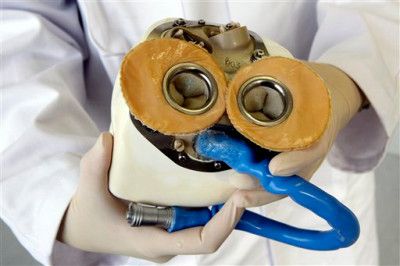From our front-page news:
We might be enjoying a day where hearts being ripped out of chests seems like a lot of fun, but the sad reality is that many people die each year due to heart-related cancers, and we desperately need a solution. Saying that "many people die" is a gross understatement though, as the official number is actually above 17 million worldwide... every single year.
French inventors might have a solution, though. They've created the world's first fully functional heart, which uses aerospace technology to a great degree. As you'd expect, the cost for one of these is not low, at $192,000, but if it's a matter of life or death, money might not be your main concern. There's little question that most people don't have that kind of money lying around though, so hopefully if the invention takes off, material prices would continually go down.
The heart uses electric sensors to both monitor and control the heart rate and blood flow, making it a very hands-off operation. If all goes according to plan, having one of these "installed" inside of you should feel no different than having a regular heart transplant, except this replacement will likely last a lot longer. So if you want to potentially live longer, start saving up some coinage, as this is something that I'd highly doubt would be covered by any insurance.

In the past there have been artificial hearts, like the much hyped Jarvik heart, however they were only a temporary fix while awaiting transplant. The key problem was that they could not adjust their pumping like a biological heart, and could only be adjusted externally. This limited their usefulness.
Source: DailyTech
French inventors might have a solution, though. They've created the world's first fully functional heart, which uses aerospace technology to a great degree. As you'd expect, the cost for one of these is not low, at $192,000, but if it's a matter of life or death, money might not be your main concern. There's little question that most people don't have that kind of money lying around though, so hopefully if the invention takes off, material prices would continually go down.
The heart uses electric sensors to both monitor and control the heart rate and blood flow, making it a very hands-off operation. If all goes according to plan, having one of these "installed" inside of you should feel no different than having a regular heart transplant, except this replacement will likely last a lot longer. So if you want to potentially live longer, start saving up some coinage, as this is something that I'd highly doubt would be covered by any insurance.

In the past there have been artificial hearts, like the much hyped Jarvik heart, however they were only a temporary fix while awaiting transplant. The key problem was that they could not adjust their pumping like a biological heart, and could only be adjusted externally. This limited their usefulness.
Source: DailyTech
